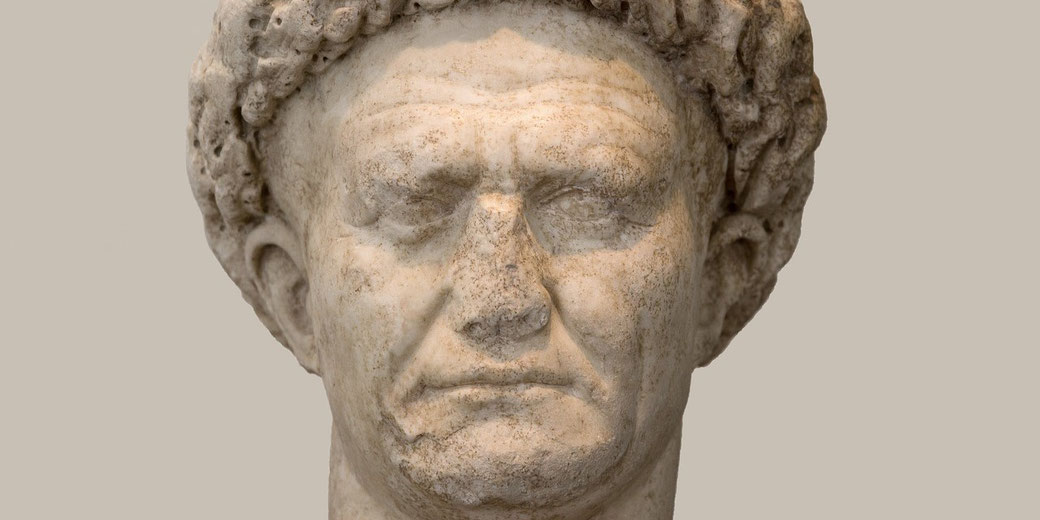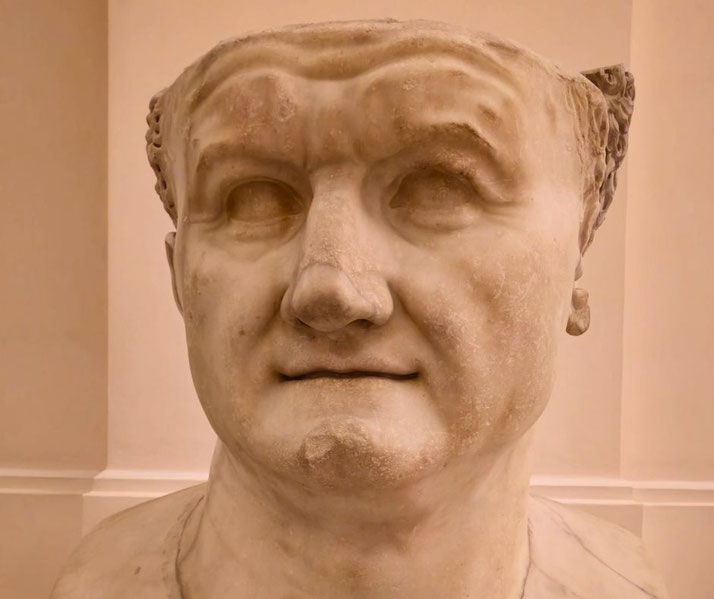Vespasian: The emperor who saved Rome

Emperor Vespasian ruled Rome from AD 69 to 79. He served in the military for many years and eventually rose through the ranks to become one of the commanders of the Roman forces in Britain.
In a dramatic turn of events, Vespasian rose to power during one of Rome’s most turbulent periods. The empire was teetering on the brink of collapse after Nero's chaotic reign and the ensuing civil wars.
However, in AD 68, he played a key role in bringing back stability and established the Flavian dynasty of emperors, which also included Titus and Domitian.
Growing up in a rural community
Vespasian was born in November of AD 9 to a little-known family of equestrian status in the small village of Falacrinae, in Italy, about 50 miles (80 km) from Rome.
Vespasian's father was called Titus Flavius Sabinus, who had had a successful career as a tax collector and banker in the Roman provinces of Asia Minor.
It appears that he had developed a reputation for being honest. Vespasian's mother was called Vespasia Polla, who came from a well-respected equestrian family.
Not much is known about Vespasian's childhood, but it appears that was given a respectable education in the village, supervised by his grandmother.
However, it was his older brother, Titus Flavius Sabinus (who was named after his father), who became more important to the family early.
Sabinus had successfully entered into Roman politics and was awarded with a military command in the Danube region.
Vespasian's early career
Following in the footsteps of his older brother, Vespasian received his first taste of military life AD 36 when he was appointed a military tribune in the region of Thrace, north of Greece.
In AD 37, he was elected as quaestor in Crete and Cyrene, as aedile in AD 39, and praetor in AD 40.
His political success seems to have brought him to the attention of the emperor Caligula.
Also, in AD 39, Vespasian married Domitilla the Elder, a woman from a wealthy family.
They would go on to have two sons together: the future emperors, Titus and Domitian.
Vespasian's first military commands
When Claudius became emperor after Caligula's assassination in AD 41, Vespasian was assigned as the commander of the Roman legion (Legio II Augusta) in Germania.
Then, in AD 43, emperor Claudius decided to launch a massive military invasion of Britain.
The German legion, including Vespasian, was called up to participate. He was a legate of legate of Legio II Augusta during the invasion and worked under the overall commander, Aulus Plautius.
Vespasian earned a name for himself as a reliable staff member and an extremely capable commander during several early battles on the rivers Medway and Thames.
As a result, he was entrusted to lead forces into the south-west of Britain. By the end of his time in Britain, Vespasian had participated in about thirty separate battles and captured around twenty towns.
Unfortunately, the intensive warfare took a toll on Vespasian, since he had received a number of wounds.
So, in AD 50, he decided to return to Rome and pursue a political career.
What political positions did Vespasian hold?
In AD 51, his military reputation and popularity allowed him to serve as consul.
However, when his time in the role had expired, he decided to go into a temporary retirement, as he had "bitterly offended" emperor Claudius' wife, Agrippina, when he was touring with the imperial family in Greece.
Even though Claudius had died in AD 54, Agrippina's son, Nero, had become emperor, which meant that Vespasian wouldn't return to another political position for over a decade.
Then, in AD 63, he was appointed governor of Africa Proconsularis (modern Tunisia).
Governorships like this were highly sought after by Roman politicians, as they usually used the power and position to increase their own wealth through corrupt means.
However, Vespasian openly rejected this approach and, instead, chose to focus on limiting expenses.
As a result, he earned a reputation as an effective administrator by reforming the tax system and improved the infrastructure of the province.
It is said that he even needed to spend some of his own money to pay for necessary projects.
As he was approaching the end of his governorship, people joked that Vespasian was leaving much poorer than when he arrived.
Vespasian's role in the suppressing the Jewish Revolt
When Vespasian returned to Rome, he called upon his military experience once more.
In AD 66, Jewish rebels in the Roman province of Judaea had risen up in armed revolt against Roman rule.
In response, Vespasian was appointed as the overall commander of the Roman forces in Judaea and was sent to crush the rebellion.
This event was significant, since Judaea had never had a legionary army appointed to it before.
Regardless, Vespasian was assigned three legions and a large auxiliary force.
Over the next two years, AD 67 and 68, Vespasian successfully conducted two major campaigns that defeated many of the rebels and won back much of the province.
By AD 68, only the capital city of Jerusalem still held out against him. The final success of the Judaean campaign was interrupted by political events back in Rome.
What happened during the Year of the Four Emperors?
In AD 68, Nero committed suicide, which led to a power struggle between powerful generals for who would be the next emperor.
This was the beginning of a tumultuous period called the 'Year of the Four Emperors'.
The first commander to seize control of Rome was Galba, who ruled for a short time.
To show his loyalty to Galba, Vespasian sent his son Titus to Rome in late AD 68.
However, on the journey, Titus heard that Galba had been murdered and that another general, called Otho, was now emperor.
Then, Otho was overthrown by Vitellius, the governor of Germany.
By this time, Titus returned to Judaea to update his father with the changing political events in Rome.
After hearing the news, Vespasian decided to take charge of Rome himself.
Leaving Titus in charge of finalising the Judaean campaign, Vespasian ordered part of the army back to Italy, while he travelled to the city of Alexandria in Egypt to secure the all-important grain supply for Rome.
Vespasian's forces arrived in Italy in AD 69, led by his commander Marcus Antonius Primus, where they defeated Vitellius at the Second Battle of Bedriacum in October.
Once Vespasian's victorious forces reached Rome itself, the troops dragged Vitellius from the imperial palace, executed him, and threw his body into the Tiber River.
By December AD 69, the Roman Senate passed the Lex de Imperio Vespasiani, which formally granting Vespasian his imperial powers.
Therefore, in December of AD 69, Vespasian became emperor, which established the new Flavian dynasty of emperors.
It would not be until AD 70 that Vespasian personally arrived back in Rome from his time in Egypt.
Sadly, Domitilla the Elder, Vespasian's wife, died before he became emperor, but she was honored posthumously and given the title Augusta.

The reign of Vespasian
Vespasian's first task as emperor was to stabilise the empire after the turmoil of Nero's reign and the Year of the Four Emperors.
He did this by strengthening the army, reforming the tax system, and improving relations with the provinces.
To replenish the empire's finances, Vespasian implemented various tax reforms, including the infamous urine tax, which taxed the collection of urine for use in the tanning industry.
As emperor, Vespasian faced a series of challenges. The first was bringing to a conclusion the Jewish rebellion.
In AD 70, his son, Titus, launched a successful military campaign against the city of Jerusalem and captured it.
The glory for this victory went to Vespasian and it helped to solidify his position as emperor.
The capture of Jerusalem also brought an influx of cash and slaves into Rome, which Vespasian used to build a range of public works projects, including repairing roads, constructing new public buildings, and restoring the Capitol.
The most famous of these was the construction of the Colosseum in AD 72, which has become one of the most iconic symbols of Ancient Rome.
Due to his popularity, Vespasian was able to rule effectively for ten years. The one criticism that ancient authors make of Vespasian is that he did not like to spend money.
He was known as a 'miser', but this was likely because he wanted to be prepared for any financial challenges that might arise.
However, during Vespasian's reign, the Roman Empire expanded its territories, including the annexation of parts of northern Britain and increased Roman influence in the East.
Vespasian's death and his significance
In AD 79, Vespasian fell ill with a fever while on a trip to Apulia. He decided to return to Rome but died on the way in the town of Aquae Cutiliae.
His last words were, "Oh dear, I think I'm becoming a god." Vespasian died of natural causes in AD 79 at the age of sixty-nine.
He was succeeded by his son Titus.
The historian Tacitus praised Vespasian for restoring peace and stability to the Roman Empire, describing his reign as a period of recovery after the chaos of the Year of the Four Emperors.
After his death, Vespasian was deified by the Senate and his memory was honoured with public statues and coins.
The name of his new dynasty was also given to a number of public works projects, including the Colosseum, known as the Flavian Amphitheatre.
Further reading
What do you need help with?
Download ready-to-use digital learning resources
Copyright © History Skills 2014-2025.
Contact via email
With the exception of links to external sites, some historical sources and extracts from specific publications, all content on this website is copyrighted by History Skills. This content may not be copied, republished or redistributed without written permission from the website creator. Please use the Contact page to obtain relevant permission.





